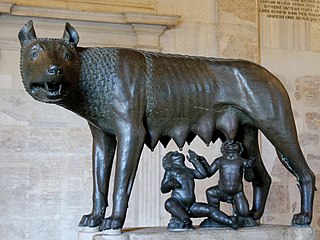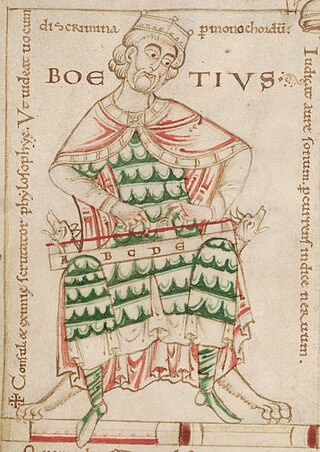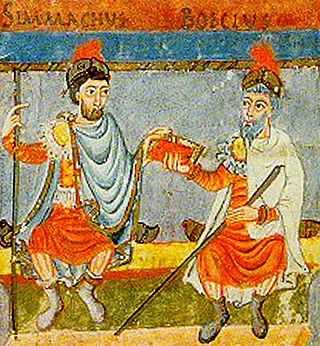
Tribune was the title of various elected officials in ancient Rome. The two most important were the tribunes of the plebs and the military tribunes. For most of Roman history, a college of ten tribunes of the plebs acted as a check on the authority of the senate and the annual magistrates, holding the power of ius intercessionis to intervene on behalf of the plebeians, and veto unfavourable legislation. There were also military tribunes, who commanded portions of the Roman army, subordinate to higher magistrates, such as the consuls and praetors, promagistrates, and their legates. Various officers within the Roman army were also known as tribunes. The title was also used for several other positions and classes in the course of Roman history.
Over the course of some fourteen centuries, the Romans and other peoples of Italy employed a system of nomenclature that differed from that used by other cultures of Europe and the Mediterranean Sea, consisting of a combination of personal and family names. Although conventionally referred to as the tria nomina, the combination of praenomen, nomen, and cognomen that have come to be regarded as the basic elements of the Roman name in fact represent a continuous process of development, from at least the seventh century BC to the end of the seventh century AD. The names that developed as part of this system became a defining characteristic of Roman civilization, and although the system itself vanished during the Early Middle Ages, the names themselves exerted a profound influence on the development of European naming practices, and many continue to survive in modern languages.
Symmachus is a name from Roman antiquity. It may refer to:

The patricians were originally a group of ruling class families in ancient Rome. The distinction was highly significant in the Roman Kingdom and the early Republic, but its relevance waned after the Conflict of the Orders. By the time of the late Republic and Empire, membership in the patriciate was of only nominal significance. The social structure of ancient Rome revolved around the distinction between the patricians and the plebeians. The status of patricians gave them more political power than the plebeians, but the relationship between the groups eventually caused the Conflict of the Orders. This time period resulted in changing of the social structure of ancient Rome.

Anicius Manlius Severinus Boethius, commonly known simply as Boethius, was a Roman senator, consul, magister officiorum, polymath, historian, and philosopher of the Early Middle Ages. He was a central figure in the translation of the Greek classics into Latin, a precursor to the Scholastic movement, and, along with Cassiodorus, one of the two leading Christian scholars of the 6th century. The local cult of Boethius in the Diocese of Pavia was sanctioned by the Sacred Congregation of Rites in 1883, confirming the diocese's custom of honouring him on the 23 October.

Magnus Aurelius Cassiodorus Senator, commonly known as Cassiodorus, was a Christian, Roman statesman, renowned scholar of antiquity, and writer serving in the administration of Theodoric the Great, king of the Ostrogoths. Senator was part of his surname, not his rank. He also founded a monastery, Vivarium, where he worked extensively the last three decades of his life.
The praenomen was a personal name chosen by the parents of a Roman child. It was first bestowed on the dies lustricus, the eighth day after the birth of a girl, or the ninth day after the birth of a boy. The praenomen would then be formally conferred a second time when girls married, or when boys assumed the toga virilis upon reaching manhood. Although it was the oldest of the tria nomina commonly used in Roman naming conventions, by the late republic, most praenomina were so common that most people were called by their praenomina only by family or close friends. For this reason, although they continued to be used, praenomina gradually disappeared from public records during imperial times. Although both men and women received praenomina, women's praenomina were frequently ignored, and they were gradually abandoned by many Roman families, though they continued to be used in some families and in the countryside.

In ancient Rome, the plebeians or plebs were the general body of free Roman citizens who were not patricians, as determined by the census, or in other words "commoners". Both classes were hereditary.

A given name is the part of a personal name that identifies a person, potentially with a middle name as well, and differentiates that person from the other members of a group who have a common surname. The term given name refers to a name usually bestowed at or close to the time of birth, usually by the parents of the newborn. A Christian name is the first name which is given at baptism, in Christian custom.
In ancient Rome, a gens was a family consisting of individuals who shared the same nomen gentilicium and who claimed descent from a common ancestor. A branch of gens, identified by the cognomen, was called a stirps. The gens was an important social structure at Rome and throughout Italia during the period of the Roman Republic. Much of individuals' social standing depended on the gens to which they belonged. Certain gentes were classified as patrician, others as plebeian; some had both patrician and plebeian branches. The importance of the gens as a social structure declined considerably in imperial times, although the gentilicium continued to define the origins and dynasties of the ancient Romans, including the Emperors.

The gens Aurelia was a plebeian family at ancient Rome, which flourished from the third century BC to the latest period of the Empire. The first of the Aurelian gens to obtain the consulship was Gaius Aurelius Cotta in 252 BC. From then to the end of the Republic, the Aurelii supplied many distinguished statesmen, before entering a period of relative obscurity under the early emperors. In the latter part of the first century, a family of the Aurelii rose to prominence, obtaining patrician status, and eventually the throne itself. A series of emperors belonged to this family, through birth or adoption, including Marcus Aurelius and the members of the Severan dynasty.

Quintus Aurelius Memmius Symmachus was a 6th-century Roman aristocrat, a historian and a supporter of Nicene Christianity. He was a patron of secular learning, and became the consul for the year 485. He supported Pope Symmachus in the schism over the Popes' election, and was executed with his son-in-law Boethius after being charged with treason.

A tribus, or tribe, was a division of the Roman people for military, censorial, and voting purposes. When constituted in the comitia tributa, the tribes were the voting units of a legislative assembly of the Roman Republic.
Siburius, for whom only the single name survives, was a high-ranking official of the Roman Empire. He was one of several Gauls who rose to political prominence in the late 4th century as a result of the emperor Gratian's appointment of his Bordelaise tutor Ausonius to high office.
Virius Nicomachus Flavianus was a grammarian, a historian and a politician of the Roman Empire.
The gens Curiatia was a distinguished family at Rome, with both patrician and plebeian branches. Members of this gens are mentioned in connection with the reign of Tullus Hostilius, the third King of Rome, during the seventh century BC. The first of the Curiatii to attain any significant office was Publius Curiatius Fistus, surnamed Trigeminus, who held the consulship in 453 BC. The gens continued to exist throughout the Republic, and perhaps into imperial times, but seldom did its members achieve any prominence.
The gens Anicia was a plebeian family at ancient Rome, mentioned first towards the end of the fourth century BC. The first of the Anicii to achieve prominence under the Republic was Lucius Anicius Gallus, who conducted the war against the Illyrians during the Third Macedonian War, in 168 BC.
The gens Annaea was a plebeian family at Rome during the first century BC, and the early centuries of the Empire. Members of this gens were distinguished for their love of literary pursuits. Several members of the family fell victim to the various plots and intrigues of the court of Nero, including the conspiracy of Gaius Calpurnius Piso.

Flavius Boethius was a Roman politician during the Ostrogothic kingdom in Italy.
The gens Cestia was a plebeian family at ancient Rome during the later Republic, and in imperial times. The first member of the gens to obtain the consulship was Gaius Cestius Gallus in AD 35. The family's name is commemorated on two monuments, the Pons Cestius and the Pyramid of Cestius which survive into modern times.









